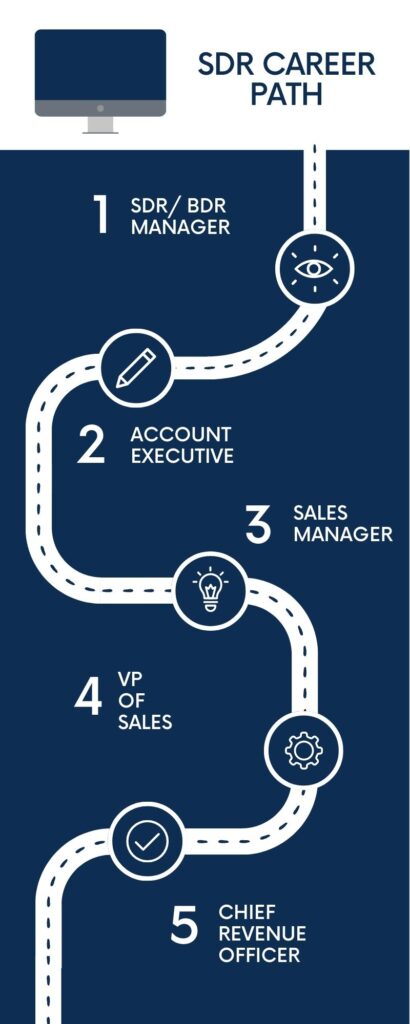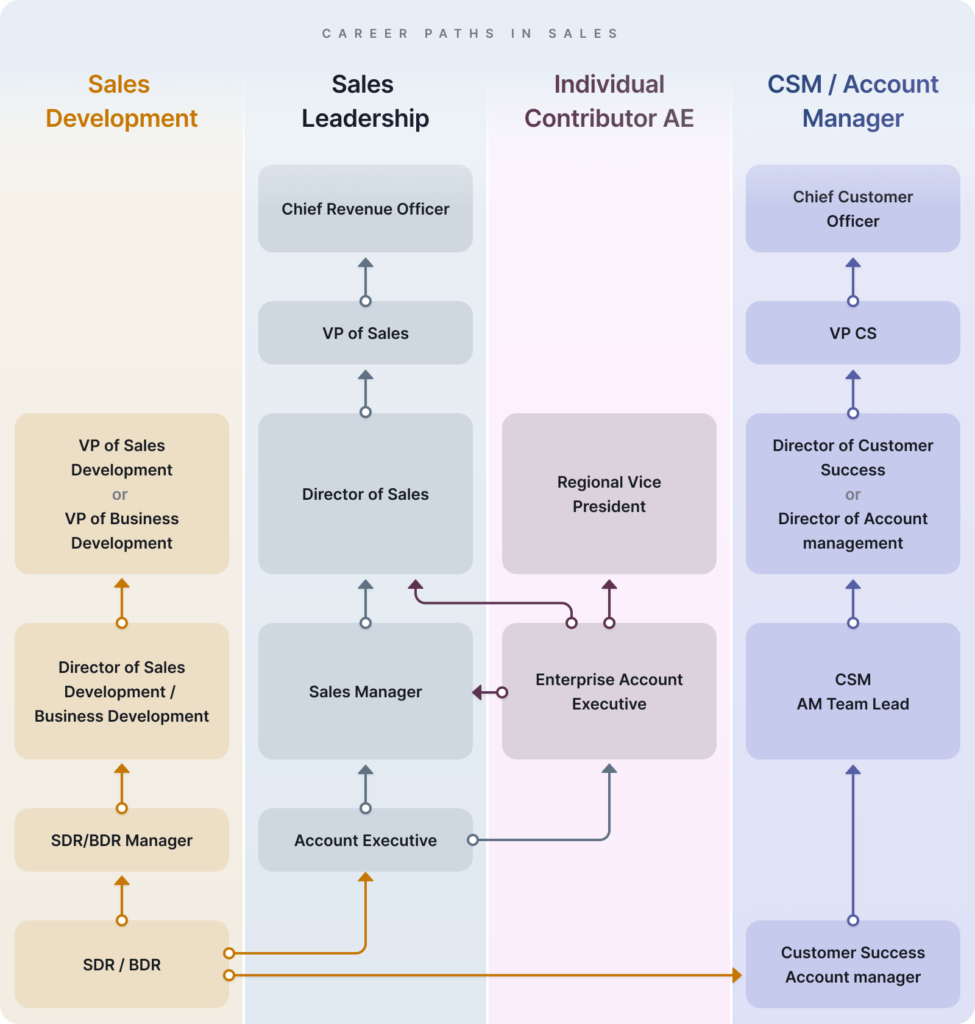
Are you a sales rep wondering about the SDR career path and how you can progress to higher roles within your organization? You’re not alone.
As an SDR, you’re at the beginning of your sales career and you are eager to explore new opportunities but there are many out there and you are confused which path to pursue.
Sales is such a versatile arena – you’ll find various roles and titles with a combination of similarities and differences in their responsibilities.
In this article, you will find the common SDR career path in B2B sales including Sales Development, Sales Leadership, and Customer Success/Account Management.
We will take a closer look at the various job titles and responsibilities within each path and explore how salaries differ by company size and location, so you can get a better idea of what to expect as you move up the ladder.
Whether you’re a recent graduate looking to break into sales or an experienced SDR looking for your next step, this article will help you understand what it takes to enhance your career in B2B sales.
Let’s get started.
- The common sdr career path
- SDR manager
- Account executive
- Sales manager
- VP of sales
- Chief revenue officer
- General set up of a b2b sales team
- Are there any other sales paths for an SDR?
- How does the size of a company affect an SDR’s career path?
The common SDR career path
While there is no one-size-fits-all career path for Sales Development Representatives (SDRs), there are several common paths that SDRs can take to advance their careers in B2B sales.

SDR/BDR Manager
Responsibilities of the role
The SDR/BDR Manager role is responsible for managing other SDRs and BDRs. For those looking for a management career path, this role may be a great fit.
As an SDR, one common decision is to progress into a closer role (AE) or into management (SDR Manager). Each route has its pros and cons.
The AE role has greater earning potential but is an individual contributor (IC) role. It also sets one up better for becoming a VP of Sales or a Chief Revenue Officer (CRO) down the line since those roles typically require closing experience.
On the other hand, the management path as an SDR Manager has less earning potential upfront but offers a chance to put “management experience” on the resume and see how one likes the responsibilities of managing a team.
As an SDR Manager, one may often feel like they have to deal with everyone else’s problems compared to an IC role where they only have their own issues to worry about.
Daily activities
SDR Managers spend their time coaching and mentoring their SDR team, providing guidance on how to improve their outreach and qualification skills.
They also work closely with other departments, such as Marketing and Product, to ensure that the SDR team is aligned with the company’s overall strategy.
Additionally, they analyze data to identify trends and develop strategies to optimize the SDR team’s performance.
Average salary of a SDR manager based on company size
| Company Size | Average salary per year |
| Start-up | $60,000 |
| SMB | ranges from $75,000 to $100,000 |
| Enterprise | ranges from $100,000 to $150,000 |
Account Executive
Responsibilities of the role
The account executive is responsible for closing deals and has a very high earning potential with commissions. They take leads from the SDR or BDR team and work with prospects to successfully close deals.
This role can highly vary based on Commercial, Mid-Market, or Enterprise, with each category indicating the size of company the AE will work with.
To be eligible for an AE role, prior sales experience, often as an SDR or BDR, is typically required. While it’s possible to jump straight to this role, it’s less common. In fact, many sales professionals spend their entire career as an AE due to its high earning potential.
As an experienced AE, you may become more selective about the types of products and solutions you sell and the types of customers you work with. With success, time, and experience, the commission structure can become very lucrative in the right company and industry.
Daily activities
Account Executives typically spend their time prospecting and reaching out to potential clients, conducting demos, negotiating contracts, and closing deals.
They work closely with other teams, such as Marketing and Product, to ensure that the solutions they offer align with the company’s overall strategy.
They also analyze data to identify trends and opportunities and adjust their approach accordingly. Additionally, they maintain relationships with existing clients and provide support as needed.
Average salary of an AE based on company size
| Company Size | Average salary per year |
| Start-up | $70,000 |
| SMB | ranges from $100,000 to $150,000 |
| Enterprise | ranges from $150,000 to $250,000 |
Sales Manager
Responsibilities of the role
A sales manager is responsible for overseeing a team of salespeople and ensuring that they meet their sales goals. Some of the typical responsibilities of a sales manager include:
- Team Management: Leading and managing a team of salespeople to ensure they meet or exceed their sales targets.
- Sales Strategy: Developing and implementing sales strategies and tactics to improve sales performance.
- Performance Tracking: Monitoring and analyzing sales metrics to track team performance and identify areas for improvement.
- Customer Relationship Management: Building and maintaining strong relationships with key clients and accounts.
- Training and Coaching: Providing training, coaching, and mentorship to team members to help them develop their skills and reach their potential.
Daily activities
Sales Managers spend their time managing and leading their team, including:
- Setting sales targets and KPIs for the team
- Developing and implementing sales strategies to achieve revenue goals
- Coaching and mentoring team members to improve their sales skills
- Analyzing sales data to identify trends and areas for improvement
- Conducting regular team meetings to review progress and provide feedback
- Collaborating with other departments such as Marketing and Product to align sales efforts with company strategy
- Participating in customer meetings and negotiations as needed
Average salary of a Sales Manager based on company size
| Company Size | Average salary per year |
| Start-ups and SMBs | ranges from $60,000 to $90,000 |
| Enterprise | ranges from $90,000 to $150,000 or more |
VP of Sales
Responsibilities of the role
The VP of Sales is a highly experienced senior executive who leads the entire sales department of an organization. This role is typically responsible for overseeing a team of Sales Managers, and depending on the size of the company, the VP of Sales may report directly to the President or CEO.
Achieving the position of VP of Sales can take a significant amount of time and experience. In larger organizations, it may take many years of people management and successfully closing large, enterprise-level deals to even qualify for consideration. If having a VP title is important to you, it may be easier to achieve in a smaller company or startup.
As a company grows, it’s common to have additional layers of middle management before reaching the VP level. Nevertheless, a VP of Sales is a highly sought-after position, and the compensation can be quite lucrative.
Daily activities
The day-to-day activities of a VP of Sales may vary depending on the company and industry.
Some common tasks include attending meetings with executives, analyzing sales data, developing sales plans, providing training to the sales team, setting sales targets, and creating sales reports.
Average salary of a Sales VP based on company size
| Company Size | Average salary per year |
| Start-up | $120,000 – $160,000 |
| SMB | $150,000 – $200,000 |
| Enterprise | $180,000 – $250,000 |
Chief Revenue Officer
Responsibilities of the role
The CRO oversees the entire revenue-generating operations of a company, including sales, marketing, and customer success.
They are responsible for driving revenue growth, optimizing the sales process, and creating alignment between all revenue-generating departments.
Daily activities
As a C-level executive, the CRO spends most of their time strategizing and leading their team.
They work closely with other executives to set revenue targets, develop new business strategies, and make critical business decisions. They also spend time coaching and mentoring their sales teams to improve performance.
Average salary of a CRO based on company size
| Company Size | Average salary per year |
| Start-up | $200,000 |
| SMB | ranges from $250,000 to $500,000 |
| Enterprise | ranges from $500,000 to $1 million |
General set of a B2B sales team
A typical sales team structure consists of different roles such as SDRs, BDRs, Account Executives (AEs), Sales Managers, and Vice Presidents of Sales.
The number of each role in a sales team can vary depending on the size of the company and the industry.
Generally, startups and SMBs may have smaller sales teams with one or two SDRs/BDRs, a couple of AEs, and a Sales Manager.
In contrast, enterprise companies tend to have larger sales teams with several SDRs/BDRs, multiple AEs across different tiers (commercial, mid-market, enterprise), several Sales Managers, and one or more Vice Presidents of Sales.
However, here is a general breakdown of the roles you might find in a B2B sales team in a startup, SMB, and enterprise:
Startup:
- 1-2 Sales Development Representatives (SDRs) – does lead generation, outbound outreach, and booking meetings
- 1 Account Executive (AE) – focuses on closing deals and also does the work of a sales manager like SDR training, performance tracking & coaching. This person will be the CEO or one of the Co-founders in most of the early stage start-ups.
SMB:
- 2-3 SDRs
- 3-5 AEs
- 1-2 Sales Managers
- 1 Vice President of Sales
Enterprise:
- 5-10 SDRs
- 10-20 AEs
- 2-3 Sales Managers
- 1-2 Vice Presidents of Sales
- 1 Chief Revenue Officer
Are there any other sales paths for an SDR?
What you skimmed through till now is the most common path that an SDR takes in her/his career. But as an SDR, you have a few different career paths available to you besides moving into an Account Executive (AE) or Sales Manager role.
One option is to specialize in a particular area of sales, such as enterprise sales, channel sales, or strategic partnerships. By becoming an expert in one of these areas, you can become an invaluable member of the sales team and have opportunities for advancement.
Another path is to move into sales operations or sales enablement.
In these roles, you will work on improving the sales team’s productivity and effectiveness by developing and implementing sales processes, tools, and training programs.
This can be a great option for someone who enjoys analyzing data, optimizing workflows, and helping others succeed.
Finally, some SDRs may choose to move into other areas of the company, such as marketing or customer success. This can be a good option for someone who wants to develop a broader set of skills or who is interested in exploring different parts of the business.
The key takeaway is that there are many different paths you can take as an SDR, and the right one for you will depend on your skills, interests, and career goals.

How does the size of a company affect an SDR’s career path?
The size of a company can significantly impact an SDR’s career path. In a smaller company, there may not be as many opportunities for advancement since there are fewer positions available. Therefore, an SDR may need to wait longer for a promotion or switch to a different company to move up the ladder.
In contrast, larger companies tend to have more defined career paths and opportunities for advancement. An SDR may have the chance to move up to a more senior SDR position or to a management role within the SDR/BDR team.
Additionally, larger companies may have more specialized roles within the sales department, such as enterprise SDR or strategic SDR, which can offer a unique career path.
However, it’s worth noting that larger companies can also have more competition for promotions and may have stricter requirements for advancement.
An SDR in a larger company may need to demonstrate exceptional performance, leadership skills, and the ability to work with cross-functional teams to move up the ladder.
On the whole, the size of a company can have a significant impact on an SDR’s career path, and it’s important to consider this when choosing a company to work for.
Final thoughts
Pursuing a career in sales can be a challenging yet rewarding experience. Whether you start as an SDR or another entry-level position, there are many opportunities to grow and advance in your career.
As you progress along your SDR career path, you can explore different roles such as an Account Executive, Sales Manager, or a VP of Sales.
Remember, success in sales is all about having the right mindset, the tenacity, enthusiasm, and adaptability – to navigate the unpredictable terrain of sales.
So, if you’re up for the challenge, take the leap and see where your SDR career path can take you! Cheers to the exciting and rewarding world of sales!